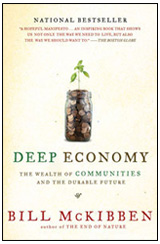Books |
Deep Economy
Bill McKibben
By
Published: May 20, 2009
Category:
Non Fiction
The Omnivore’s Dilemma may have been the most disturbing and challenging book published in 2006.
In 2007, that book may be "Deep Economy."
Disturbing? It’s like the doctor telling you that you have cancer. And not just you — you and everyone you know.
The good news: There is a cure. And with the energetic support of business and government, you and everyone you know can be saved.
The bad news: Our economic system is based on a crude, outdated model: More = better. Blinded by the mantra of growth, our leaders will try to make that model last as long as possible — even if they destroy the planet in the process.
The challenging action item: You want to help save the world? Think local. Think community.
Your reaction is mine: No way. Shopping at a farmer’s market: nice, but unimportant. Better bus service: handy, but inconsequential. Solar panels and wind turbines: of anecdotal importance. At best, the “economics of neighborliness” will divert us as the temperature and water rise.
On the other hand, this is Bill McKibben talking. And only a fool doesn’t pay attention to this guy. In 1989, he published “The End of Nature,” the first book to call attention to global warming. He’s written about population control and television and the challenge of remaining human as the world becomes digitized. (And he’s not just a brainiac. In “Long Distance,” the 37-year-old McKibben put himself through Olympic-intensity training to see how good a cross-country skier he could become.)
McKibben has the ability, rare among writers, of identifying a problem, reporting on it, thinking it through and proposing solutions — all in 225 pages. Here the problem he sees is unchecked growth. The usual suspects say we’re in no danger of draining the planet’s resources. McKibben points out that we — that’s Americans — suck resources out of all proportion to other countries.
McMansions: Until 1970, Americans lived in houses about the size of today’s garages.
Food: 75% of the apples sold in New York come from the West Coast or overseas, even though New York produces ten times more apples than its residents consume.
Energy: Americans use twice as much as Europe.
McKibben’s argument gains force when he gets down to examples. His idea of name-dropping is charming: “When I was last in Bangladesh….” Other stops on his travels: Brazil, China, India. And in each place, he discovers some brilliant innovation that saves energy and boosts the quality of life. (But that doesn’t take America off the hook. If rich countries don’t change, he says, the poor ones won’t — they take their dreams from us.)
The great sociologist Philip Slater points out, “The first cure for illusion is despair.” These pages give you plenty to mope about; our earliest prophet of global warming unleashes some gloomy predictions here. One hundred eighty million dead Africans by century’s end if we don’t change our wasteful ways. Twenty per cent of the global economy sheared off. The rich in bunkers, the poor at the gates — it’s not a pretty picture.
But life wants to live. And so, like grass pushing through the cracks in cement, people — nameless, uncelebrated people — find a way to sane living and greater satisfaction. After he scares the hell out of you, Bill McKibben shows you where to look for those people and tells you why you’ll be happy if you join them.
Prepare to be very, very excited.
To buy “Deep Economy” from Amazon.com, click here.
To buy “The End of Nature” from Amazon.com, click here.
To read more about “Long Distance,” click here.


